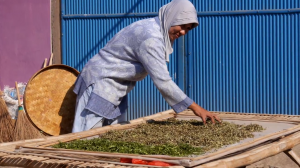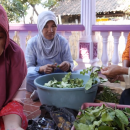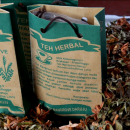Women of Kraksaan leading the way in mangrove conservation
Location: Kraksaan sub-district, Probolinggo district, East Java province, Indonesia. 26th Feb 2016
Mangrove degradation in Kraksaan sub-district is attributed to the large scale conversion of mangrove land into milkfish, shrimp or salt ponds. This is a phenomenon known as 'rent intensification' or 'renting system diversification'; a renting system available for investors since the 1990s. These production methods are unsustainable largely due to inappropriate construction methods, often eroding the embankments due to exposure to the sea and destroying the edge of the farms. Today, Kraksaan sub-district has the lowest percentage of mangrove coverage at 45%, compared to other sub-districts.
In the face of a declining ecosystem and insecure livelihoods, Tutut expresses her fears for the future, "If the environmental condition continues to deteriorate, it will lead to the decrease in shrimp and milkfish production or might even lead to production failure. The fingerlings will not come and stay at the pond when there are no mangroves."
Through the MFF Small Grant Facility (SGF); Sido Agung Farmer group, aims to increase the volume and scope of mangrove cover in Kraksaan to build overall community resilience. As a result, Tutut became one of 17 members of the Sido Agung Women's Group, comprising of women from three villages who received training on mangrove and fish-based food processing. These capacity development initiatives have presented benefits for Tutut, her peers and the wider community in different ways.
Another woman who benefited from the initiative is Tutik Sumarti. The civil servant and mother, who received training in processing Daruju herbal tea production, highlighted the importance of mangroves in her daily life, "We need to re-vegetate the coastal areas to prevent the areas from getting eroded. Mangroves provide so many benefits for me, for example I can make herbal tea." Through the initiative, Sido Agung Women’s Group has not only improved the participating women's technical capacity but also allowed them to generate sufficient additional income for their family; in the last nine months, the herbal tea activities generated a profit of USD 1,600. "The income generated from selling mangrove herbal tea has been used to buy kitchen utensils that I need. This can be an alternative income source for other female community members too; collecting holy mangrove leaves," Tutik added.
Silsilah, a mother of two and trader by profession, also gave examples of how the initiative has improved her life as well as her family’s. In addition to generating extra income from selling mangrove products made by the women’s groups, Silsilah now has additional time to make room for activities that were neglected before. "I can now afford to buy a television and have time to watch the TV together with all my family members,” said Silsilah. Like the others in her village, Silsilah understands the important link between mangrove regeneration and the overall well being of the community. "If mangroves continue to deplete, the number of fish will also certainly go down. Fish cannot stand heat and so take shelter under mangrove trees. Replanting mangrove will ensure the sustainability of people’s livelihoods."
Unlike Silsilah, who was aware about the socio-economic benefits of mangroves prior to the project, Ummy Kalsum, also known as Ibu Haji (a well respected woman who has completed pilgrimage to Mecca), was initially opposed to planting mangrove trees around the ponds, "I used to think that the trees would block the direct sunlight required in drying out salt in the pond. I also thought that fallen leaves would damage the soil around the pond,” said Ummy.
Now, through a salt bank programme where her mangroves have grown over 50 cm tall, Ummy is a local champion in mangrove conservation. She encourages more and more salt farmers to initiate mangrove rehabilitation along reservoir dykes of their salt ponds.
For more information, visit this page.


